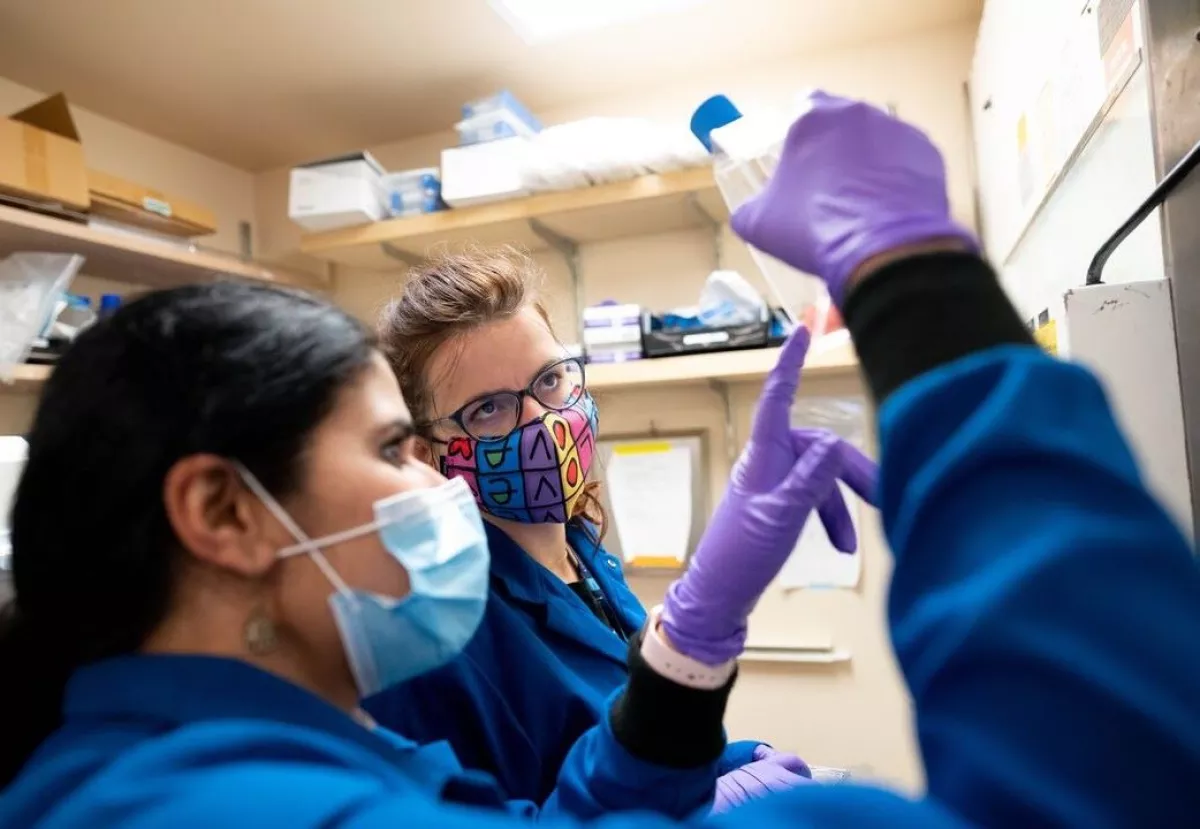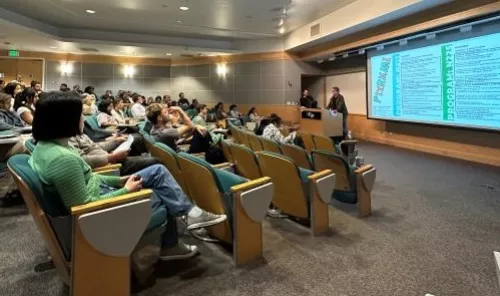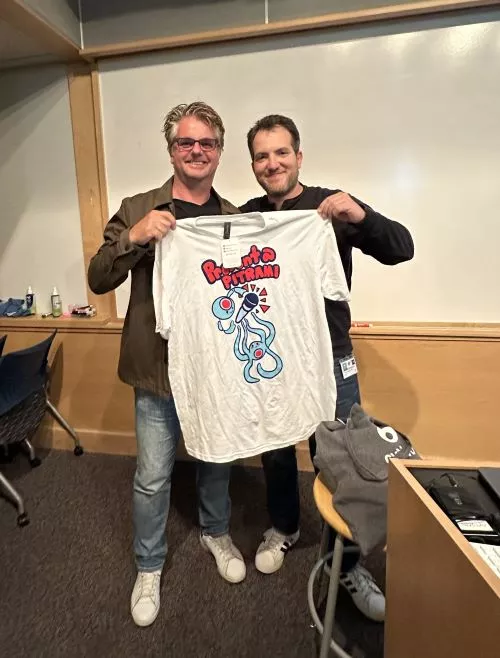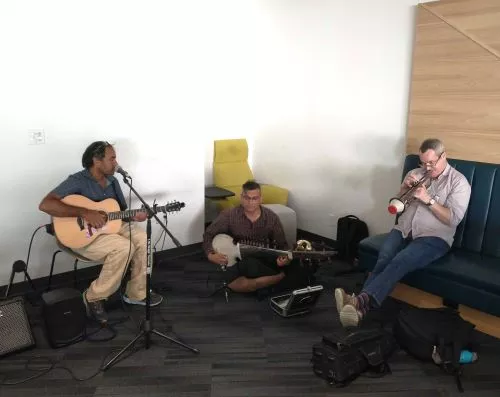
November 22, 2024
By Shelley Wong
The winter Parnassus Institute Trainee Minisymposium (PITRAMI) will convene on December 3 in a half-day event of researcher flash talks and connecting across shared interests and new discoveries. Began in 2023 by principal investigator and vice chair of Anatomy Jeroen Roose, PhD, these thrice-yearly events feature graduate student and trainee speakers and are enthusiastically attended by the Parnassus research community. The event is open to UCSF-wide research community.
There is powerful research momentum at Parnassus. Construction is underway for the state-of-the-art UCSF Barbara and Gerson Bakar Research and Academic Building (BRAB), which will house Benioff Center for Microbiome Medicine, iMicro, Bakar ImmunoX, Diabetes Center, Helen Diller Family Comprehensive Cancer Center research teams, and CoLabs, among others, and is expected to be completed in 2027. Roose conceived of PITRAMI as part of the Comprehensive Parnassus Plan to create vital community spaces for dialogue and exchange.
“Every Parnassus community member should know about PITRAMI,” says Roose. “Biomedical research is becoming more and more cross-disciplinary, a theme that is embraced at Parnassus and can also be recognized in the design of the new BRAB.

“I believe it is important to bring the entire Parnassus trainee community together three times a year. I am delighted that PITRAMI has become a success and am thankful to the trainees who are organizing.”
Postdoctoral fellow and past PITRAMI lead organizer Miho Tanaka, PhD (Aguilar lab and Spitzer lab), says, “It’s useful to see what your peers are doing and see if there’s any collaboration or input that you can get from people inside or outside of the field. In the middle of my postdoc, I started working on fibroblasts in cancer and only knew one or two labs doing similar work. Once I started going to talks, I started keeping track of others with different expertise on different aspects of the cell type so I can find people to talk to who can share the protocol with me to help with my experiments.”
These collegial interactions epitomize the UCSF team science spirit of collaboration across departments, schools, and groups.
Organized voluntarily by students and trainees for their peers, the event is unique in being a larger in-person gathering of the Parnassus research community, standing apart from meetings that are focused on a particular floor, department, or institute. The winter PITRAMI agenda consists of a series of flash talks held in parallel session, followed by a festive holiday social hour with refreshments and holiday giveway “swag,” with opportunities to meet Parnassus research colleagues.

Graduate student Rachel Rock (Turnbaugh lab), the lead PITRAMI organizer, is still recruiting speakers for the event (more information). She says, “We want a broad array of graduate students and trainees to be represented.” Rock and colleagues have recruited speakers to cover a variety of research areas, including stem cell and neurology in addition to immunology and cancer.
At the last PITRAMI, Rock heard a talk by fellow BMS student Laura Dwyer on CD4+ T cells related to pregnancy, similarly to Rock’s research on how a specific human gut bacteria can influence CD4+ T cells in the context of autoimmunity, where there is a sex difference.
She says, “We were sharing some of the antibodies we use, asking questions, and thinking more broadly about inflammatory markers. I had a ‘wow’ moment that PITRAMI allowed me to hear colleagues talk about research I might not have heard otherwise.”
Rock praised specialist Tristan Courau, PhD (Krummel lab), for his “amazing job” organizing the June 2024 PITRAMI. Faculty members Mallar Bhattacharya, MD, Satish Pillai, PhD, and Peter Hunt, MD, formed a band for the ImmunoX retreat and performed a live set during the June PITRAMI social hour events. She hopes for similarly high turn-out to close out 2024 in a festive holiday fashion.
The event is an excellent showcase for students and trainees to share the results of the year’s hard work while building their presentation skills.

“PITRAMI provides an outlet to have greater visibility, receive feedback, and give a talk in a less intimidating setting than a conference – and have fun. People can enjoy the social gathering and discover something new,” says Rock. “One of the biggest reasons why people should attend is that it’s a friendly symposium. It’s a unique event for trainees, lab technicians, and PIs across all research disciplines.”
Having an informal space for introductions and checking in with colleagues allows researchers to make connections for future knowledge-sharing and collaboration. “It’s a chance to learn what the person you often see in the elevator is up to and have the opportunity to interact and maybe collaborate with them and be useful to each other,” says Courau. “Since Covid, it’s hard to bring people together in person and PITRAMI is trying to accomplish that at the local scale.”
The Winter PITRAMI talks will be held on December 3 from 2:30-3:30 p.m. (session 1) and 4-5 p.m. (session 2) in HSW-300 and 301 at Parnassus. A festive social hour with food, refreshments, and giveaway “swag” to follow in HSW-300 lobby from 5-7 p.m. to encourage informal networking.
PITRAMI is sponsored by a contribution from the Community-Building Small Grants Program in the Office of Research.
Please register to attend (for planning purposes).
Register to give a 10-minute talk (for graduate students, trainees, and lab technicians).